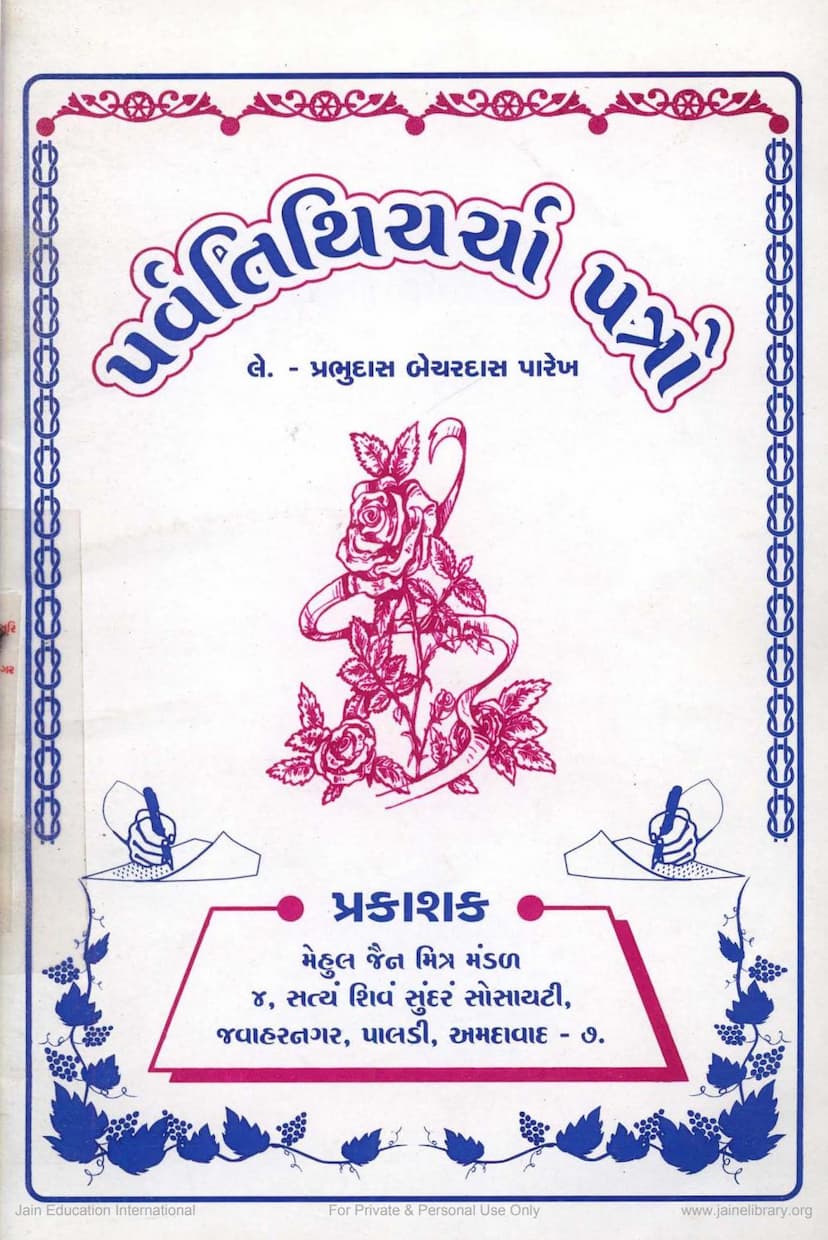Parvatithicharcha Patro
Added to library: September 2, 2025

Summary
This is a comprehensive summary of the Jain text "Parvatithicharcha Patro" by Prabhudas Bechardas Parekh, based on the provided pages:
Book Title: Parvatithicharcha Patro (Letters on Festival Dates) Author: Prabhudas Bechardas Parekh Publisher: Mehul Jain Mitra Mandal, Ahmedabad Year: V.S. 2002 (2005 CE) Edition: 1st Price: 20 Rupees
This book contains a collection of letters written by Prabhudas Bechardas Parekh, a prominent thinker dedicated to Jainism. The letters primarily focus on a debate and discussion regarding the correct observance of specific Jain festival dates, particularly the Samvatsari (annual repentance day) and the "twelve festival dates" (Bara Tithi). The author engages in deep scriptural analysis and logical reasoning to advocate for adherence to traditional practices and to question changes that might lead to division or ashatna (disrespect/violation) within the Jain community.
Here's a breakdown of the key themes and content from the provided pages:
Central Conflict: The "Bara Tithi" (Twelve Festival Dates) and Samvatsari Observance
The core of the text revolves around a dispute concerning which days should be observed as festival days, specifically leading to variations in the observance of Samvatsari. The author strongly argues for maintaining the traditional dates based on scriptural evidence and the practices of the Yug Pradhan Acharyas (foremost acharyas of an era).
Key Arguments and Discussions:
-
Adherence to Tradition and Scriptural Proof: Parekh emphasizes the importance of following the established scriptural traditions and the conduct of great Acharyas. He cites various scriptural texts and commentaries (like Chaitya Vandan Bhashya, Sanghachar Vritti) to support his arguments against altering the dates. He believes that deviating from established traditions without strong scriptural backing is inappropriate.
-
The Case for Tuesday for Samvatsari: The author makes a strong case that Tuesday is the correct day for Samvatsari based on the practices of Yug Pradhan Kalikacharya Maharaj. He argues that any shift to Wednesday was due to royal intervention and that a return to the traditional Tuesday is essential to uphold scriptural integrity.
-
The Issue of "Kshaya" and "Vriddhi" (Waning and Waxing of Tithis): A significant portion of the text delves into the technicalities of astrological almanacs (Tippani or Panchang) and how Kshaya (when a tithi spans less than a full day) and Vriddhi (when a tithi spans more than a full day) affect festival observances. The author meticulously analyzes different scenarios of Kshaya and Vriddhi in relation to the festival dates, particularly Chaturthi (4th day) and Panchami (5th day) in the context of Samvatsari. He questions the methodology and reasoning behind certain interpretations of these almanacs.
-
Critique of Deviation and the Need for Unity: Parekh expresses concern that deviations from established practices lead to division (bhed), conflict, and ashatna within the Shri Sangh (Jain community). He advocates for a unified approach and urges leaders and followers to prioritize community harmony and respect for tradition.
-
The Role of Acharyas and Community Discipline: The author highlights the responsibility of Acharyas in upholding the discipline (shishta) of the Jain Shasan (faith/order). He expresses disappointment when decisions are made that contradict established norms or lead to fragmentation. He also touches upon the importance of Acharyas not being forced into decisions by lay followers.
-
Detailed Analysis of Specific Scenarios (Hypothetical and Real):
- He poses several hypothetical questions about how Yug Pradhan Acharya would act if almanacs showed different Kshaya or Vriddhi scenarios (e.g., two Panchamis, a Kshaya of Panchami or Chaturthi).
- He addresses practical challenges faced by the community, such as internal disputes over property (96 Number Canning Street) which complicate matters and raise concerns about potential conflicts during festivals.
- He refers to previous discussions and agreements among Acharyas, including the differing views of Acharya Vijayramchandrasurishwarji Maharaj and Acharya Sagaranand Surishwarji Maharaj, and the need for clear scriptural basis for any changes.
-
The Importance of "Shasan" (Jain Order/Governance): A significant philosophical discussion is initiated by Parekh regarding the five pillars of Jain Dharma: Eternal Dharma (Five Conducts), Shasan Institution (Tirths, Teachings), Shraman Sangh (Four-fold Community), Shastras (Scriptures), and Religious Assets. He emphasizes the paramount importance of the Shasan and its discipline, arguing that any deviation from its rules, even for perceived good Dharma activities, can ultimately lead to the erosion of the Shasan itself.
-
Questioning the Basis of Certain Interpretations: Parekh engages in a detailed dialogue with the recipient of his letters (likely a respected Jain scholar or leader) regarding specific astronomical calculations and their interpretation within Jain tradition. He questions the basis for certain interpretations of "Kshaya" and "Vriddhi" and seeks clarification on the precise meaning and application of scriptural verses like "Kshaye Purva" and "Vriddhi Uttara." He also delves into the differing interpretations of the "Praghosh" verse and its relevance to festival date calculations.
-
Emphasis on Truth, Reason, and Non-Attachment: Throughout the letters, Parekh advocates for a rigorous, logical, and evidence-based approach to resolving these differences. He encourages open discussion and a willingness to consider all viewpoints without prejudice or ego. He stresses the need for clarity and the avoidance of arguments that are based on mere convenience or personal preference.
-
A Call for Rectification and Unity: The underlying message is a plea for the Jain community to return to its foundational principles, uphold scriptural authority, and maintain unity. He urges for the correction of any errors or deviations to prevent further division and ashatna.
In essence, "Parvatithicharcha Patro" is a scholarly and passionate appeal by Prabhudas Bechardas Parekh for the faithful observance of Jain traditions, particularly concerning festival dates, rooted in scriptural integrity, logical reasoning, and the desire for community harmony. The letters serve as a testament to his deep commitment to the Jain faith and his intellectual rigor in addressing complex issues that affect the practice of Jainism.